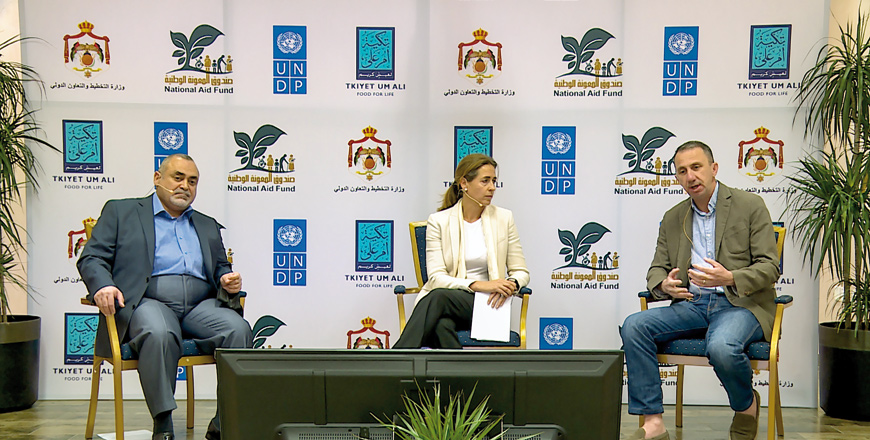AMMAN — Around 85 per cent of Jordanian vulnerable households were heavily impacted by the COVID-19 pandemic last year, a local study revealed.
The findings were released in a study titled “Impact on Most Vulnerable Households in Jordan - Overview of Findings from A Rapid Impact Assessment, Round 2, November 2020”, which was conducted by United Nations Development Programme (UNDP) office in Jordan and Tkiyet Um Ali, a non-profit organisation providing food support to vulnerable communities in Jordan, via the video conferencing platform Zoom.
The virtual event, which was held at the National Aid Fund (NAF) headquarters in Amman, aimed to explore the report’s finding in terms of understanding the impact of the pandemic on families in Jordan, and ways to respond to its repercussions.
“The study, which was conducted in two parts, revealed that many families are still facing great challenges and are not optimistic about solutions in the near future,” according to consultant Muin Khoury, who prepared the study.
Round 1 was conducted during the lockdown in the last week of April until May 3, while round 2 took place between October 19 and November 9, 2020, Khoury said.
Round 1 used a random sample of low-income Jordanian households based on the Tkiyet Um Ali database (92 per cent), Palestinian refugee households (7 per cent) and Syrian refugees (1 per cent) in one sample framework, Khoury added.
Meanwhile, round 2 included a separate sample of 400 Palestinian refugee households, and 1,200 Jordanian households to make up a total sample of 1,600 households with different demographic characteristics, he added.
“The survey focused on the most vulnerable households based on the Tkiyet Um Ali database, from a sample framework drawn from around 20,000 Tkiyet Um Ali vulnerable household beneficiaries,” Khoury explained.
This report was part of a series of rapid impact assessments initiated in 2020 by UNDP to determine the impact of COVID-19 and lockdown measures on households across Jordan and, in partnership with the International Labour Organisation (ILO) and FAFO Institute for Labour and Social Research, on enterprises in Jordan, according to Khoury.
UNDP Resident Representative Sara Ferrer Olivella said that this assessment is part of a series of evaluations carried out by UNDP to understand the great impact of the pandemic on families and businesses in Jordan.
“The assessment indicated that many families still face many challenges that affect their daily lives, especially the vulnerable sector,” Olivella told the gathering.
This, the UNDP official added, works to exacerbate many of the challenges of existing inequality,” Olivella added.
Also speaking during the event was Tkiyet Um Ali Director General Samer Balqar who stressed that the organisation was part of the social protection group that was established by the Ministry of Social Development.
“We worked on many fronts and throughout the Kingdom ever since the pandemic’s outbreak by helping families and daily wage labourers,” Balqar told the gathering.
NAF Director General Omar Mashaqbeh also explained the fund’s role during the COVID-19 pandemic.
“We helped around two million people through our various programmes with an estimated half a billion Jordanian dinars,” Mashaqbeh said.
Director of Policies and Studies Department at the Ministry of Planning and International Cooperation Hathram Fayez said the ministry worked to ensure the support of all sectors in the country, including the daily wage labourers.
“Our main concern has always been the health safety of our citizens while at the same time opening up the market and other sectors to ensure that labourers can work and earn a living during these difficult times,” Fayez said.
